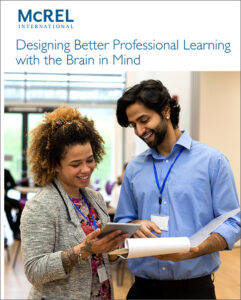Why does some professional development fall flat, while others resonate with teachers and make a real difference? How can professional learning be made better and lead to lasting changes in teacher practice?
Schools and districts can get more out of their investment in professional learning for teachers (and principals) by creating PD systems, sessions, and supports that align with decades of research on brain science and effective adult learning.
In this paper, we share an overview of six phases of learning that everyone goes through when learning something new (which you can read about in more depth in Learning That Sticks). We show how this learning model offers clarity and practical guidance for school and district staff who develop PD sessions, helping them design and sequence professional learning experiences that are more engaging and more effective at addressing educators’ needs.
Big Ideas
A brain-based, six-phase model that facilitators and developers can use to guide the creation, planning, and delivery of more effective sessions.
Evidence-backed guidance for closing “knowing-doing” gaps and connecting sessions with educators’ real problems of practice and growth goals.
Practical insights and takeaways for school leaders, instructional coaches, and PD coordinators to make the most of their professional learning investment, build positive school cultures, and help their educators flourish.
From the Paper . . .
To view and download a free copy of this paper, please complete the information below and click “Submit.”
We will also add you to our email list so that you can learn more about this topic and other resources from McREL.

